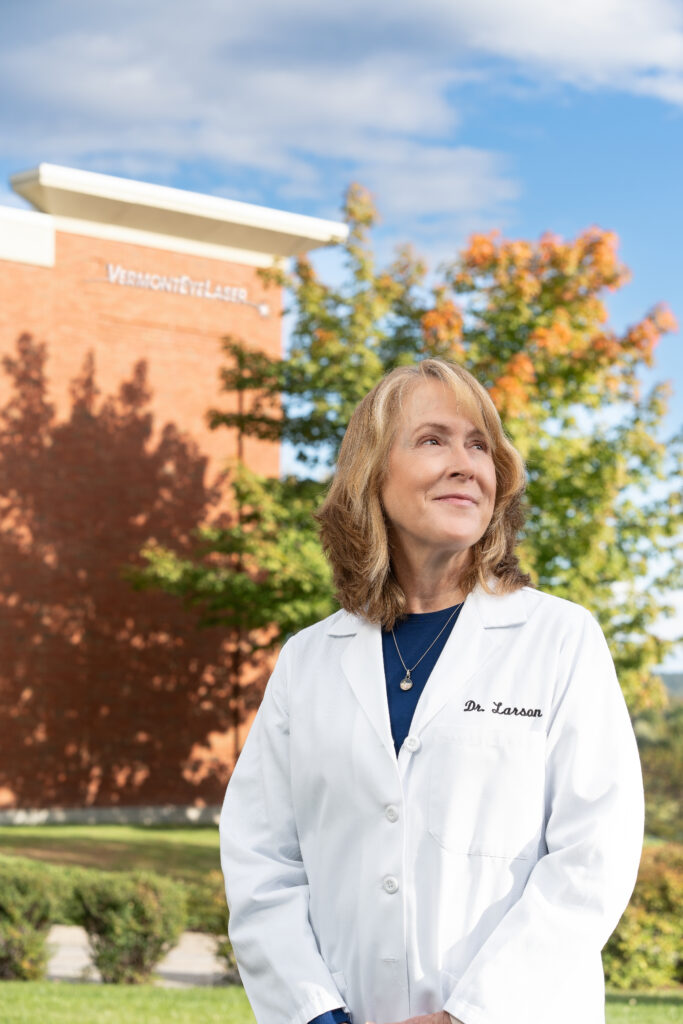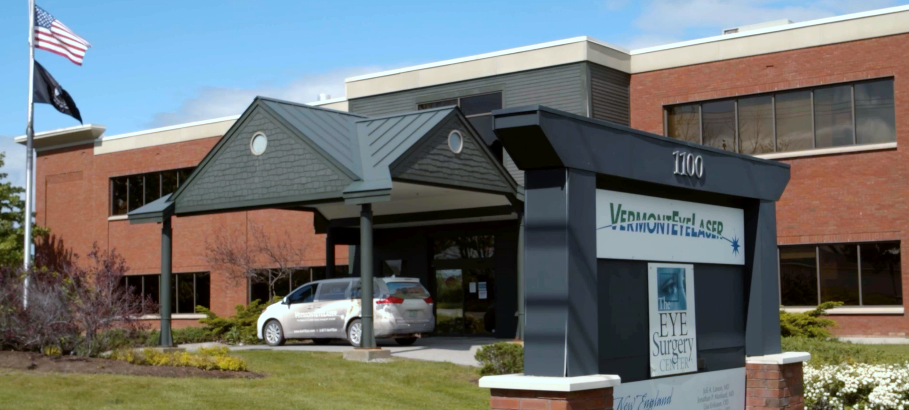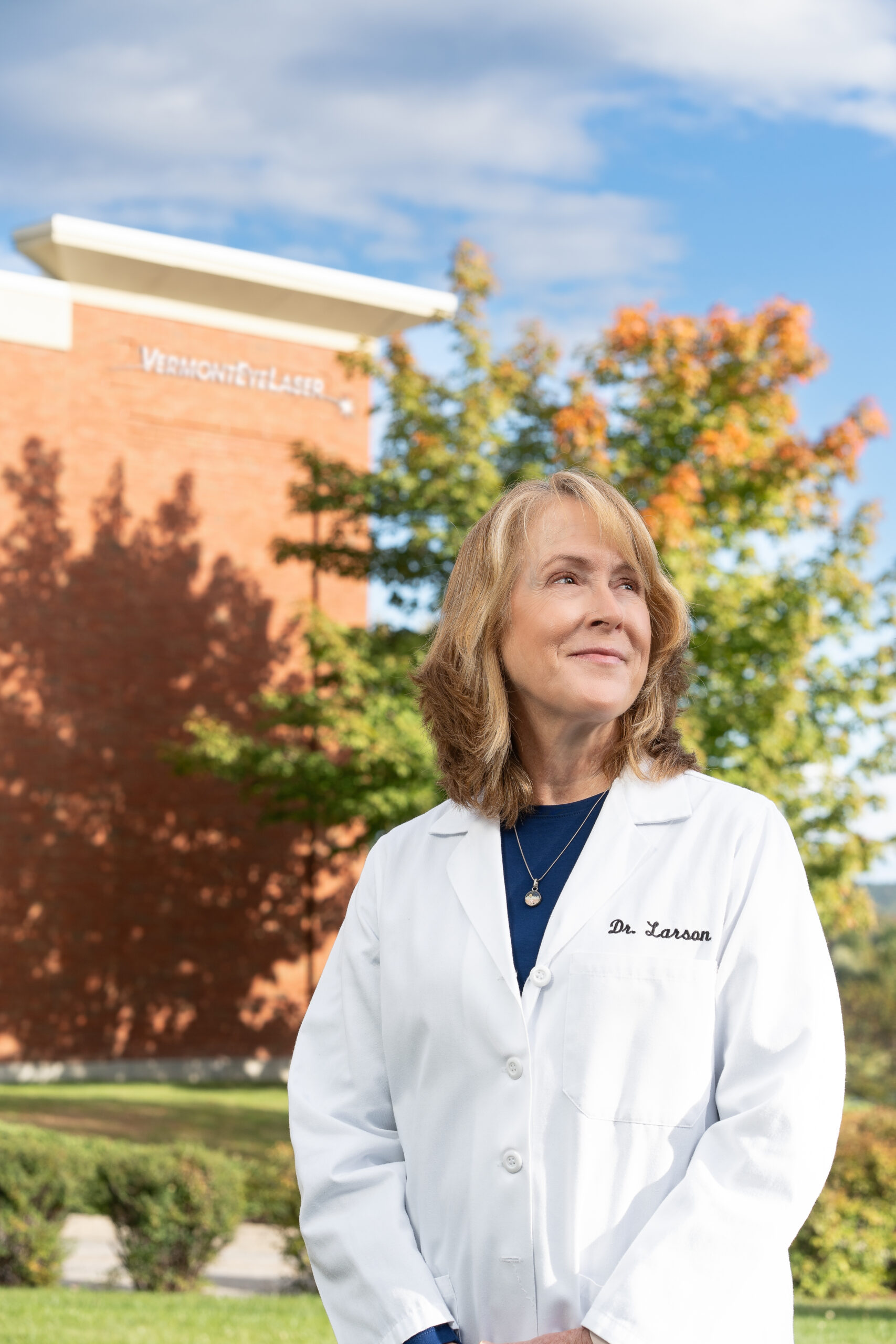By Tim Wassberg. Vermont Maturity.

Vision is one of most important senses. Juli Larson, M.D. is the Founder, Medical Director, and lead ophthalmologist at New England Vision. The Headquarters in South Burlington also home to Vermont Eye Laser and the Cataract Surgery Center. Larson’s path to her all-in-one center was the result of hard work, a sense of optimism, and a deeply held belief to offer the best care possible for her patients. Larson’s approach is both detail oriented but also patient forward.
Larson did her training in Chicago. She says she feels very fortunate that she was able to train in ophthalmology as “It is one of the most competitive residencies there is.” Larson did her ophthalmology training at Cook County Hospital. At CCH, the great thing, she says, is that they were the actual doctors. “We certainly had attending physicians that helped and guided us, but the patients looked to us as their doctor.” As a result, she says, as residents, they got to do many procedures which many programs didn’t have available for residents. “As a result, we got a lot of surgical experience.”
Her husband and young family were drawn to Vermont as a lifestyle choice. Living in a place that can provide a rewarding work environment and also be a place you want to spend time when you aren’t working. “My three sons grew up skiing, OK one is a snow boarder, but we especially love hanging out on Lake Champlain!”
For the first 15 years she practiced in Vermont, Larson was an attending physician at the University of Vermont, where she performed cataract surgery and cared for emergency patients. For the last 15 years she has performed all her cataract surgery at the Eye Surgery Center in South Burlington where all they do is eye surgery.

Larson was the founder of the Eye Surgery Center, which she was able to get approved through the state. She says Vermont was the last state in the country to get an ambulatory surgery center (ASC). One of the driving forces, she says, for the ASC was efficiency and cost control. “The first 15 years I operated at UVM, and we are lucky we have a good hospital.” But she says it wasn’t efficient for eye surgery. “If I had all day to do cataract surgery, the most they would let me do was 10. If I operate all day at the Eye Surgery Center, I can do up to 25.” Her point is that Vermont is the second oldest population state in the country, with a tsunami of cataracts at our door step needing care, so we have to be efficient!
Another benefit of operating at the Eye Surgery Center is it is very predictable, the staff is highly trained which provides patients a level of comfort, and the providers confidence in the level of care they can deliver.
Larson says that it is her staff that makes surgery a positive experience because they really help patients through the process. She recalls one patient a few years ago who was sitting in her exam chair post-op from surgery on his second eye. “We usually do the eyes about a week or two apart. So I’d already done his first eye. He just had the second eye done, and he’s sitting there and he said, ‘Dr. Larson, you might think this is kind of weird, but I like eye surgery.’ “ Larson says she thought that really shed light on the type of care the patients received, and how not all surgery has to be scary. Procedures done here are time-tested and some of the most safe and effective procedures out there.
Larson says the whole process of cataracts and cataract surgery, for her, is still fascinating and fulfilling. “I often have a very profound relationship with people, forged in a very short period of time.” Many times, patients are referred from their local eye provider for cataract surgery. “It’s my job to not only make them feel comfortable and feel confident but also to explain to them all the options and the risks of surgery.” This way, Larson can help them through the process.
“When cataract surgery is performed, an intraocular lens is placed in the eye.” The IOLs, she says, have been around since the 1980s. She makes references to patients pre-1980s after cataract surgery who had thick coke bottle glasses, her mother was one of these patients. This is before IOLs were implemented. “Now we can put in an implant that will not only help patients see clearer, but also let them see way better without glasses than they ever have before, for both near and distance!” She calls these lenses “Lifestyle Lenses.” Larson says she spends a lot of time talking to people about IOLs and their goals for their post-operative uncorrected vision. Some patients are happy to continue to wear glasses, and others desire more independence from glasses. “This is an individual choice and my goal is to explain the different options.”
Larson has also been doing LASIK surgery for almost 25 years. She says a lot of her cataract patients that are coming back now are people she performed LASIK on 20+ years prior. They now have aged and developed cataracts. “These patients wanted less dependence on glasses in the past, and still desire it after cataract surgery, after all, swimming, playing pickle ball, hiking, and hunting are easier without glasses!”
The reality though is that cataracts can’t be prevented. “Sometimes cataracts happen sooner to people on certain medications.” She says specifically steroids can induce cataracts at a younger age. “But I tell people, cataracts are one of these things we’re all going to get if we’re lucky enough to live long enough.” She says not every cataract has to be removed if people are happy with their vision. “If they’re okay with a little bit of a blur or even a moderate blur, they don’t have to have cataract surgery. But most people want to see clearer.” Larson also says if someone’s not legal to drive, “I tell them they have to do cataract surgery if they want to keep driving. But basically, there’s nothing you can do to prevent a cataract from happening.”
Larson’s years of experience doing cataract and LASIK surgery also allows her to quickly adapt because every patient is different. She says cataract surgery is very step-dependent, requiring a well-trained team. “I couldn’t do my job if the pupil wasn’t dilated properly…if the patient didn’t receive the proper numbing medicine…if they weren’t positioned properly on the gurney…or if I don’t have the right equipment.” Larson says cataract surgery is a multi-step process before it gets to her to do the actual surgery. “My part is just one piece of the puzzle.” She says, after doing a lot of surgery, one gets to be very efficient and the more of it you do, the more comfortable you are with it.
Larson remembers when she was the youngest eye surgeon in the state. “When I moved here, I was the newbie. And, as you can imagine, that is not the case anymore, but I’m lucky to have two other surgeons in my practice. There’s Dr. Jillian Kaplita, and Dr. Tim Link.” Larson says they bring newer techniques, and energy to the practice. She adds that Link also just finished a fellowship in cataract and refractive surgery.
New England Vision also treats glaucoma. Larson explains that glaucoma occurs when there’s too much pressure in the eye. Usually this is treated with drops or with a laser which they can do on-site at her center as well. Larson says there’s also a procedure they can do at the time of cataract surgery to help lower the pressure which is called an eye stent.
Larson also has two optometrists that work in her practice: Dr. Jennifer Devita, O.D. and Lisa Martin Eriksson, O.D. “They both have been with me for about 20 years.” She says they also take care of the majority of the general eye care and glaucoma monitoring. “They don’t do surgery but they’ve been the backbone of my office. I think in many practices, they don’t utilize optometrists.” Larson says they also help her with many of her post-op follow ups, which she says is critical, “because I do so much surgery. I wouldn’t be able to do [as much] surgery if I had to see every single post-op follow up. So, they really help the practice run smoothly. “And they are extremely caring and capable. Patients really like them a lot.” Patients, she says, also want to have time to ask questions and have their questions answered which this process allows for. “And the patients know if there’s a problem, I’m here. So, if there is an issue, they would be instantly referred back to me.”
Larson also has a satellite office in Plattsburgh. The patients do come to Vermont for their surgery, but some of the follow-ups can be in New York, cutting down on their patient’s travel time.
With all that has transpired, Larson feels fortunate that all of her work is in one place. “This certainly doesn’t look anything like the practice I took over back in 1993,” she laughs. But the balance helps her maintain focus and optimism. “I was operating all morning, and I just walk up the stairs and I’m in my office and I can see patients in the afternoon.” Dr. Larson is also the Medical Director of the surgery center, “so I’m always here if they need me for something which is really, really nice.”
To learn more about New England Vision, Vermont Eye Laser and the Cataract Surgery Center, visit lasermyeyes.com.


Comment here